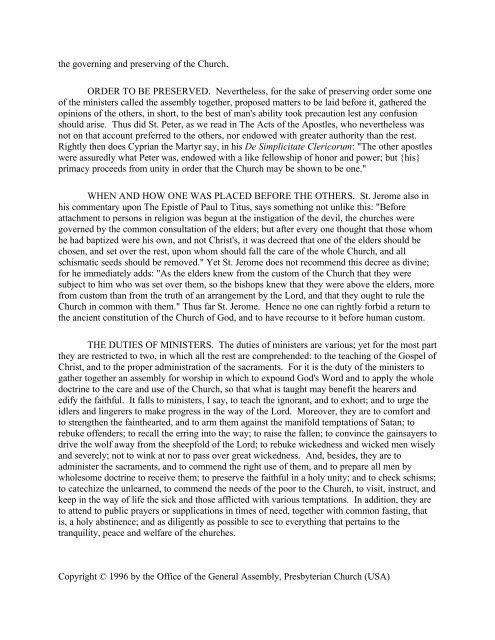The Book of Confessions - The Presbyterian Leader
The Book of Confessions - The Presbyterian Leader
The Book of Confessions - The Presbyterian Leader
Create successful ePaper yourself
Turn your PDF publications into a flip-book with our unique Google optimized e-Paper software.
the governing and preserving <strong>of</strong> the Church.<br />
ORDER TO BE PRESERVED. Nevertheless, for the sake <strong>of</strong> preserving order some one<br />
<strong>of</strong> the ministers called the assembly together, proposed matters to be laid before it, gathered the<br />
opinions <strong>of</strong> the others, in short, to the best <strong>of</strong> man's ability took precaution lest any confusion<br />
should arise. Thus did St. Peter, as we read in <strong>The</strong> Acts <strong>of</strong> the Apostles, who nevertheless was<br />
not on that account preferred to the others, nor endowed with greater authority than the rest.<br />
Rightly then does Cyprian the Martyr say, in his De Simplicitate Clericorum: "<strong>The</strong> other apostles<br />
were assuredly what Peter was, endowed with a like fellowship <strong>of</strong> honor and power; but {his}<br />
primacy proceeds from unity in order that the Church may be shown to be one."<br />
WHEN AND HOW ONE WAS PLACED BEFORE THE OTHERS. St. Jerome also in<br />
his commentary upon <strong>The</strong> Epistle <strong>of</strong> Paul to Titus, says something not unlike this: "Before<br />
attachment to persons in religion was begun at the instigation <strong>of</strong> the devil, the churches were<br />
governed by the common consultation <strong>of</strong> the elders; but after every one thought that those whom<br />
he had baptized were his own, and not Christ's, it was decreed that one <strong>of</strong> the elders should be<br />
chosen, and set over the rest, upon whom should fall the care <strong>of</strong> the whole Church, and all<br />
schismatic seeds should be removed." Yet St. Jerome does not recommend this decree as divine;<br />
for he immediately adds: "As the elders knew from the custom <strong>of</strong> the Church that they were<br />
subject to him who was set over them, so the bishops knew that they were above the elders, more<br />
from custom than from the truth <strong>of</strong> an arrangement by the Lord, and that they ought to rule the<br />
Church in common with them." Thus far St. Jerome. Hence no one can rightly forbid a return to<br />
the ancient constitution <strong>of</strong> the Church <strong>of</strong> God, and to have recourse to it before human custom.<br />
THE DUTIES OF MINISTERS. <strong>The</strong> duties <strong>of</strong> ministers are various; yet for the most part<br />
they are restricted to two, in which all the rest are comprehended: to the teaching <strong>of</strong> the Gospel <strong>of</strong><br />
Christ, and to the proper administration <strong>of</strong> the sacraments. For it is the duty <strong>of</strong> the ministers to<br />
gather together an assembly for worship in which to expound God's Word and to apply the whole<br />
doctrine to the care and use <strong>of</strong> the Church, so that what is taught may benefit the hearers and<br />
edify the faithful. It falls to ministers, I say, to teach the ignorant, and to exhort; and to urge the<br />
idlers and lingerers to make progress in the way <strong>of</strong> the Lord. Moreover, they are to comfort and<br />
to strengthen the fainthearted, and to arm them against the manifold temptations <strong>of</strong> Satan; to<br />
rebuke <strong>of</strong>fenders; to recall the erring into the way; to raise the fallen; to convince the gainsayers to<br />
drive the wolf away from the sheepfold <strong>of</strong> the Lord; to rebuke wickedness and wicked men wisely<br />
and severely; not to wink at nor to pass over great wickedness. And, besides, they are to<br />
administer the sacraments, and to commend the right use <strong>of</strong> them, and to prepare all men by<br />
wholesome doctrine to receive them; to preserve the faithful in a holy unity; and to check schisms;<br />
to catechize the unlearned, to commend the needs <strong>of</strong> the poor to the Church, to visit, instruct, and<br />
keep in the way <strong>of</strong> life the sick and those afflicted with various temptations. In addition, they are<br />
to attend to public prayers or supplications in times <strong>of</strong> need, together with common fasting, that<br />
is, a holy abstinence; and as diligently as possible to see to everything that pertains to the<br />
tranquility, peace and welfare <strong>of</strong> the churches.<br />
Copyright © 1996 by the Office <strong>of</strong> the General Assembly, <strong>Presbyterian</strong> Church (USA)




